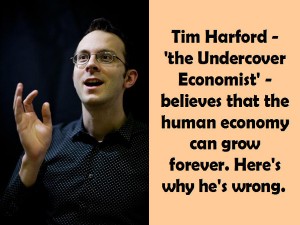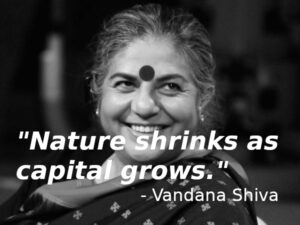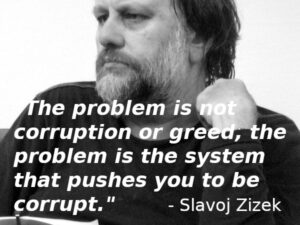The elephant in the room that will be present at all pre-election debates

Last night I attended an event organised by our local Transition group, Transition Town Tooting, where local people were able to meet and chat to parliamentary candidates for the upcoming general election. The Conservatives, Labour, the LibDems and the Greens were represented. UKIP were invited but didn’t turn up, and so they were ’empty chaired’. However, there was a giant ‘elephant in the room’ that more than made up for the empty chair. I’ll explain the nature of the elephant below.
The evening started with a presentation by Transition members, and unsurprisingly, it had a Transition theme. We were shown a chart of the number of planet earths that would be required for the whole world to have the same level of consumption as various countries. It’s what’s known as a country’s ecological footprint. For the US it was five, for the UK, four; for China, one; and for India, 0.4. In other words, if the whole world wanted the same level of consumption as the US, we would need five planets.
Then the elephant made its first appearance. The whole world DOES want the same level of consumption as the US, and they are going full throttle to try to achieve it. So it’s clear that if China, India, Africa and Latin America are going to increase their levels of consumption, then the US and Europe need to drastically reduce their consumption, because we only have one planet. It only takes a moment’s reflection to realise that that isn’t going to happen. And the reason it’s not going to happen is economic growth. Every single country, rich or poor, is going flat out for economic growth.
Now, some people at this point might say that economic growth is possible as long as it doesn’t cause material growth – then we can stay within the ‘one-planet’ limit. Here are four logical steps to explain why that’s impossible.
- We can’t have material growth forever – it has to stop at some point. (I don’t think anyone’s really disagreeing with this). As the world’s ecological footprint is already more than one planet, that means that the time to stop is now, if we don’t want nature to seriously hurt us.
- Economic growth always increases spending power. If it doesn’t, it’s not economic growth, it’s something else – like devaluation of the currency. (some people struggle with this one, but think about it – GDP is measured in terms of money, so as long as the currency isn’t devalued, then economic growth is going to mean that people have more money to spend. The opposite is true too – in economic recession, people have less money to spend).
- The increase in spending power can’t be ring-fenced, and restricted to non-material goods. If people have more money, they buy more cars, TVs, clothes, foreign holidays, second homes etc. (this is obvious, surely; it became clear to me when I saw an interview with footballer Andrey Shevchenko, and he explained that he had nine Ferraris. I’m sure he would have had ninety if he’d had more money).
- So if an increase in spending power means material growth, and economic growth means greater spending power, but we can’t have more material growth, then the logical conclusion is that we can’t continue to have economic growth. Instead, we have to stabilise globally, then redistribute so that we can all have decent lives.
My point is not that I don’t think we should have constant economic growth, it’s that it’s physically impossible to continue trying to achieve perpetual growth without damaging ourselves, and ultimately, if we don’t stop, making ourselves extinct. I hope that logic is clear, because if it isn’t, the rest of this blog isn’t going to make much sense to you.

After the initial presentations, we huddled on tables with the candidates to talk about the kind of future we’d like to see for Tooting. The first table I was on contained the Tory candidate, Dan. I’ve known him for a while, and had some good discussions with him. I think he’s a good guy (I know, I know, but he is). He’s said to me in private that he’s in favour of the free market, but not in favour of multinational corporations dominating it. He’d prefer to see local economies dominated by independent, local businesses. He stated it again in public that evening. So I believe him, and on that point, we’re in complete agreement – a free market full of independent businesses seems infinitely better to me than a market rigged for corporate benefit (how can bank bail-outs be anything at all to do with a free market?). The problem for me is that he’s a member of an extremely pro-corporate party, and the growth and competition that is inherent within our economic system ensures that the global economy (and therefore ultimately, local economies) are dominated by corporations. It’s unavoidable within a capitalist system – and not only that, but the system encourages independent businesses to grow so that given time, they can become giant corporations too. Capitalism has no brakes. The High Streets and shopping centres in wealthier parts of London, and all over the country, are dominated by multinational chains, and as long as we have a corporate-dominated system, that is exactly what is coming to Tooting.
Lower house prices were on the wish list too, but again, there is zero chance of this within the current system. Affordable houses and independent shops getting a larger slice of the economy are things that are only achievable if we replace this economic system with one that doesn’t have to constantly grow. During the breaks, I put that point to several members of the public in attendance, and to my surprise, they all agreed. It’s a pity that politicians don’t.
Next I chatted to Esther, the Green candidate. As you’d expect, she was lovely, but even she said that we could only have growth ‘if it was sustainable’. But growth is the opposite of sustainable, as I explained above. She said that sustainable growth had been achieved in Canada, for example. I pointed out that Canada has an eco-footprint of around five planets and growing, but we didn’t have time to continue the discussion.
Phil, the LibDem candidate said nothing I can remember, and the Fleur, the Labour councillor standing in for Sadiq Khan, busy with Westminster duties, was a machine when it came to ripping into the Tories. Conservative Dan didn’t rise to the bait. He said that we should be talking about and voting for individuals, which is fair enough – and if he left a party committed to eternal growth and stood as an independent, I’d consider it.
But in the end, I found myself looking at a panel of parliamentary candidates, all of whom seemed to believe in the elephant of perpetual economic growth, the quest for which in the end will wipe out any local gains that groups like Transition manage to bring about. I felt slightly depressed at the absurdity of it, but optimistic that several people I spoke to recognised it as an absurdity. The candidates were genuine people, I think – but the problem is not people, it’s our economic system.
The views expressed in our blog are those of the author and not necessarily lowimpact.org's
47 Comments
-
1screenbeetle March 19th, 2015
I’m surprised by the Green Party candidate’s stance on growth. I am maybe a bit out of touch but for years the Green Party’s official stance was very much against economic growth of any kind. As well as being the view of everyone I knew in the party, I’m pretty sure that having zero growth or less was echoed throughout the Green Party’s official policy statements. I’ll have another read but I think she may be out of step with her own party.
It would be worth contacting Esther to clarify her position.
-
2Elisabeth Winkler March 19th, 2015
I believe the Green Party has addressed the elephant:
Green Party policystates:
“All human economic activity and social and cultural wellbeing are dependent upon the integrity of self-sustaining, self-managing natural systems.
Continually increasing resource extraction, industrial throughput and waste production is entirely incompatible with ecological sustainability.
Green economic policy must therefore promote the emergence of an economic system which recognises the limits of, and is compatible with, both the natural systems of the planet and the aspirations of the whole of humanity.
-
4Dave Darby March 19th, 2015
Agreed, the Green Party’s policies are light years ahead of the other parties, but having looked through their policies, nowhere does it say that zero growth is the aim. ‘an economic system which recognises the limits of, and is compatible with, both the natural systems of the planet and the aspirations of the whole of humanity’ can be interpreted in just the way that Esther interpreted it.
I told her that I was going to vote Green anyway, because a) it’s a statement that people care about green issues, and b) as I said, their policies are light years ahead of other parties.
I also said to her (and she agreed) that it wouldn’t really be possible for the Greens to make big changes in one country if they gained power, because if, for example, they stabilised the economy in the UK, then within a capitalist world, it would scare off investors and cause a major economic downturn, which would mean that they’d lose the next election to a party that would chase growth again.
Maybe that’s why they’re not coming right out and saying zero growth – because they know that it’s not possible to do that in one country.
I keep saying this, but we can’t vote in a sustainable system in one country. Change has to be global and systemic.
-
5Elisabeth Winkler March 20th, 2015
I think “zero growth” can sound scary to some people because it sounds like zero food, zero jobs etc.
I think we need to show that zero growth is something flourishing, growing, thriving…
…and that sustainable, green, low-impact living actually means more food, more jobs and more stability.
For instance community owned- renewable energy is good for the planet, gets people out of fuel poverty, and creates more jobs.
-
6Elisabeth Winkler March 20th, 2015
Another question: how would you define “zero growth”?
-
7screenbeetle March 20th, 2015
I couldn’t find a headline commitment – so to speak – to zero growth but there are references to it on their website. Under their Economy Policy -> Objectives section there is this sentence:
EC201 To this end, the Citizens’ Income (see EC730) will allow the current dependence on economic growth to cease, and allow zero or negative growth to be feasible without individual hardship should this be necessary on the grounds of sustainability. (see PB104-106)
-
8Peter Richardson March 20th, 2015
The Green Party policy is pretty clear on this, and is pretty good in my view (and worlds ahead of any other party):
“PB105 We cannot go on indefinitely exploiting and wasting the natural resources of a finite world. If humans continue to promote policies which require the unlimited consumption of raw materials, it will lead not to more riches, even for the few, but poverty for all.
PB106 The pursuit of economic growth as a force driving over-exploitation of the Earth must cease to be an automatic aim of human societies. We should instead aim to develop sustainable economies, which improve well-being focused on human values rather than consumerism. Traditional measures of economic activity, such as GDP, should be replaced by new indicators that measure progress towards this aim.”
(http://policy.greenparty.org.uk/philosophical-basis.html)
Economic growth is almost always associated with an increasing carbon footprint, but isn’t necessarily so. Imagine a hypothetical society based entirely on recycling, and re-use, planet friendly agriculture, and crafts made from sustainable raw materials. Your next door neighbour has twins, followed by another set of twins, meaning that as they grow up the total amount of economic activity in the country increases. In this hypothetical world, the increase in economic activity is the right sort of ‘safe’ economic activity, so it isn’t a problem.
So although in the current system, economic growth is likely to mean unsustainable growth, it doesn’t automatically follow in all scenarios. Consequently I can see why Green candidates might prefer to say that the party is committed to stopping ” pursuit of economic growth as a force driving over-exploitation of the Earth” rather than saying that the party is committed to ‘zero growth’. It’s a fine distinction, but the distinction is there and is a valid one.
As a shorthand, amongst those who actually understand how GDP is measured (e.g. you get burgled or crash your car, and that increases GDP, but represents a reduction in your quality of life), zero or negative growth is a reasonable term to use, but to the general population, who have been brainwashed to think growth must be good, it would be frightening to start saying we must have zero or negative growth…. and better to say that the only sort of growth we’d be in favour of would be (truly) sustainable growth.
-
9Elisabeth Winkler March 20th, 2015
Truly sustainable growth – I like!
-
10Peter Richardson March 20th, 2015
But actually, we must move the focus away from economic growth, which is irrelevant. The two measures we need to monitor, and focus the attention of the electorate on, are
1) how much are we wrecking our life support system (the earth)
2) is human happiness and wellbeing increasing, or decreasing.
-
11Paul Jennings March 20th, 2015
Steady state economics would seem to be a better or more positive label than zero growth, but as Edward Abbey said “growth for the sake of growth is the ideology of the cancer cell.” Put in that light I’m not opposed to the use of the phrase zero growth.
I actually think that it’s about time people got scared; in fact if you’re not scared (and angry) you’re probably not paying attention.
One of my problems with Green Party politics is that Greens have to play the political game: they mustn’t scare people; they mustn’t use language that is considered beyond the politically acceptable; they mustn’t point out that a vote one way or another is very unlikely to make any difference, because to do any of these things would perhaps reduce the chances of their election, and they still believe, despite all the evidence to the contrary, that if they are present in great enough numbers in the legislatures of the world they will be able to bring about meaningful reform.
I don’t believe it.
As it happens, I also don’t subscribe to the Transition notion that together all people of goodwill can kick-start some kind of transforming process that will resolve very real differences of interest at the heart of our society.
I’d have been well out of place at that meeting the other night.
Anyway, back to economic growth. We are not allowed to talk about equality of outcomes. We are allowed to spout platitudes about equality of opportunity, as if setting off from the same starting line in a race of life and death is somehow fair, but we are not allowed to say that only an equality of outcomes is genuinely just, the sort of equality that one would expect to find in a society that endeavoured first to meet everyone’s needs.
The aspirations of the vast majority of humans seem quite modest to me: a roof, appropriate clothing, food on the table, friends and family around us. The world did not have to be as it is today in order for all of those things to be achieved, and moreover achieved with enough time to spare that we should not want for leisure or the time to develop a proper conception of citizenship, one which would bear no comparison to the role of the voter.
In the absence of real equality we are offered growth; we are offered the race to ever improving material conditions as if that might be the truest measure of the good life. There’s bread and circuses for most of us; extraordinary wealth for the tiny minority, more wealth than anyone should have (Ask a politician to say that). Economic growth then serves the ruling class, that has never been clearer.
Dave, I agree that the economic system is the problem, but the economic system is supported, as economic systems have always been, by an intricate ideological scaffolding. The scaffolding comprises the educational system, the mass media and of course, liberal politics. It is within the milieu of liberal politics that we are supposed to politely discuss how the pie will be cut, but it’s not really like that is it? We don’t decide anything about the pie; the pie is not ours and even a Parliament full of Green MPs would not change that one iota.
-
12Elisabeth Winkler March 20th, 2015
“Hope is the fuel of progress and fear is the prison in which you put yourself” said the late Tony Benn.
Human beings need hope to move forward otherwise we can become paralysed by fear.
Right now the green surge in the UK gives me hope – as does what has happened in Iceland, and in Greece with Syriza.
I do not want to undermine the green shoots of a movement before it has had a chance to take root.
-
13Paul Jennings March 20th, 2015
Hmmm, It seems to me that in order for hope to be well founded it needs to be based on intellectual honesty.
I believe that fear of ecological catastrophe is actually quite a rational position to hold, but it’s not my language which is circumscribed by fear, it’s the language of those whose politics uses only the vocabulary prescribed by their masters.
If I am going to hope for anything, it will not be for politicians to deliver something that is not in their power to deliver. Syriza, Podemos and the Greens channel discontent and the desire for change into parliamentary politics; they could be using their energies in other ways.
-
14Peter Richardson March 20th, 2015
Paul wrote:
“We don’t decide anything about the pie; the pie is not ours and even a Parliament full of Green MPs would not change that one iota.”
Hyperbole, surely.
You might as well say that the current composition of our parliament has no effect on out health system, food system, military system. So you would be happy with a parliament full of fascists… that wouldn’t worry you?
I know that parliament isn’t the only powerful force in the UK (there are the corporations, the media, the military, other powerful nations and economies, the thinking element of the population and the less-thinking element of the population, etc) but parliament still has a lot of power, I believe.
As we have a parliament, I want to see Greens in it. Think what an impact just one Green MP, Caroline Lucas, has had on the political atmosphere of the UK. Imagine 400 like her! I agree with Elisabeth, I think there is hope, and for me, the colour of hope is Green.
Not that we should put all of our faith in the political system, of course. It’s up to all of us to take things in the right direction, do what needs doing, and try to stop the stuff that shouldn’t be happening. One extra way of doing that is supporting the green movement in the political system, while we also tend our gardens and polytunnels, make our placards, organise our boycotts, set up community organisations and ethical businesses, and try to educate and inspire people towards a better way of living.
-
15Dave Darby March 20th, 2015
Definitely. Low-impact, small-scale, independent businesses employ more people.
-
16Dave Darby March 20th, 2015
Stable GDP
-
17Dave Darby March 20th, 2015
It’s an oxymoron. Well, if you mean economic growth it’s an oxymoron. Growth in ideas, experience, art, love, spirituality, beauty – bring it on.
-
18Dave Darby March 20th, 2015
Fairy nuff. I’d propose that zero global growth is necessary now, as the current global human eco footprint is more than one planet.
-
19Dave Darby March 20th, 2015
Peter – do you agree that the current mass extinction event we’re in has been caused by human activity?
-
20Dave Darby March 20th, 2015
That’s like sitting on the Titanic saying that focusing on the iceberg is irrelevant. The human economy is the cause of the extinction event we find ourselves in, and it won’t stop until the global economy is stabilised.
-
21Dave Darby March 20th, 2015
Yes, I have no problem using less scary terms.
Steady-state economics = ‘look at that beautiful big white thing. Maybe we should steer away from it a bit so that we don’t damage it.’
Zero growth = ‘it’s a fucking iceberg!’
-
22Paul Jennings March 20th, 2015
No, no hyperbole. We live in a society with unprecedented levels of state control. The fascist regimes of the Twentieth Century could have only dreamed of the surveillance and ideological penetration enjoyed by the modern state. On top of that protest of any sort is becoming much harder and whilst we do not see genocide in our country, our genocides are exported. The murder we export, the destruction we send abroad, supports our access to cheap bread and to circuses.
From where I stand on the political compass, Peter, we already have a Parliament full of fascists. Dismiss that as more hyperbole if you wish, but I am not one for bandying empty rhetoric.
I disagree with your position because it is demonstrable that it has failed. We could be having this discussion about the future of the Labour Movement in 1880 – although clearly we would be in the much preferable position of doing so face-to-face and over a pint of beer. Reform is a broken reed and Parliament is worse than powerless, it is part of the ideological support system for global capitalism.
Frankly, I haven’t noticed the impact of Caroline Lucas, but I know she is the darling of the Green Surge. In Greece the people who voted for Syriza are already discovering the limits of political power and the same would be true here, and probably much more violent were there to be any threat of a Green Government.
I am not saying that there is no hope, Peter. What I am saying is that it is not to be found in the Green Surge. The onions I’ve planted this week will play a more positive role in the world than all of the politicians, ballots and votes cast in 2015 put together; that might seem quite a lot of pressure to heap on the shoulders of my little onions, but really all they need do is grow away and send down their roots and make their little contribution to a few people’s dinner tables and they’ll already have been more effective than our Parliamentary representatives.
-
23Dave Darby March 20th, 2015
And yes, I’ve had that argument with Transition members, who think that a critical mass of good people doing good things will be reached, and that all our problems will be solved, within this current system. But at the same time, the juggernaut of capitalism and economic growth is trundling along, undoing all the good that they do. I give the example of Green & Blacks, Ben & Jerry’s and the Body Shop. They were supposed to be about a new way of doing business. They started making money, and capitalism swallowed them. They now belong to Cadbury’s, Unilever and L’Oreal respectively. Capitalists are happy for us to pootle about doing our little things (things that are very valuable, by the way), but anything that looks like it might challenge their power will be bought or crushed. The only thing that can change that situation is an entirely different system. It’s coming – nothing lasts forever (Francis Fukuyama is completely wrong), and so the faster it comes the better.
-
24Dave Darby March 20th, 2015
Yes, the entire Lowimpact.org website expresses hope I think (and hope).
And I hope and believe that we can bring about systemic change.
-
25Dave Darby March 20th, 2015
Peter – I wouldn’t say that governments can’t change anything at all – of course they can. They could stop the privatisation of the NHS for a start.
But…… (and I’d really like to know what you think about this)
Imagine the Green party form the government. They would form the government of one country.
Do you see that the kind of policies we’d like to see would scare off international investors?
In the context of global capitalism, that would mean mass unemployment and recession.
Then they’d lose the next election to a party that would reverse all their policies.
I don’t agree with Paul that they couldn’t do anything – they could, but ultimately, in my tired analogy, we’d still be headed for the iceberg.
We have to bite the bullet and admit that we can’t steer away from the iceberg under the current system of capitalism and liberal democracy. Ecology is degrading fast, and as long as we have a cancerous economic system that can’t be tamed via parliamentary democracy, it will continue to do so until it’s game over. Paul’s right that scary things have to be talked about openly, even if they’re scary. We have to man up. Sorry, person up.
-
26Dave Darby March 20th, 2015
And as for the growth thing – I’ll keep saying this until someone shows me it’s wrong.
1. we can’t have material growth forever, and it should stop now
2. an increase in spending power causes more material growth, because it can’t be ring-fenced around non-material things
3. economic growth increases spending power (or it’s not economic growth)
4. therefore, economic growth can’t continue forever, and it should stop now
-
27Dave Darby March 20th, 2015
UK politicians aren’t fascists Paul. But parliament is corporate-controlled – directly and indirectly. It’s not really where the power is – power is ultimately where the money is. But why am I teaching my grandmother to suck eggs?
But I disagree that individuals are fascists – it’s the system, not people.
-
28screenbeetle March 20th, 2015
Two conflicting ways of thinking here. Everyone’s ends are arguably in line but the means are very different.
On the one hand there seems to be the classic Green Party view that effective environmental change can happen within the current political system – Light / Bright Green thinking if you will. On the other hand is the view that nothing short of radical systemic change will come close – used to be called Deep Green thinking but that’s possibly a bit soft given the above. More eco anarchism maybe ?
A pragmatic question to ask is; can the former approach lead to the latter? Major systemic change can’t happen without hitting a point of critical mass. How close are we to that critical mass at the moment? Arguably not very. I’ve heard the argument that a revolutionary tipping point can come pretty quickly if a movement can create the right buzz, and then capture the momentum. If that’s your position then it’s reasonable to try and create the buzz and capture the momentum. But it’s worth asking what social climate best helps create that momentum? Would a greater degree of awareness of environmental issues help? How about a greater degree of mainstream awareness? Or are we excluding the mainstream?
Whether you reject or agree with the Green Party they are bringing attention to the issues. Way more attention than if they didn’t exist.
All interesting stuff.
-
29Elisabeth Winkler March 20th, 2015
Growing onions is vital!
But I do feel it is important not to dismiss Parliamentary representatives, however limited their powers may be.
People who vote tend to be Conservative and Ukip voters.
If you don’t vote, you allow Conservative and Ukip to win.
-
30Dave Darby March 20th, 2015
I’d agree with that. I think that systemic change is essential, but the Green Party could increase awareness and buy us time.
It only takes an hour of my time to vote every five years, so I’ll vote Green, in the full awareness that a change of government is not enough, and my god, I’d rather live in a country with Caroline Lucas as PM rather than the knob we’ve got.
-
31Paul Jennings March 20th, 2015
If only to avoid – already too late perhaps – fulfilling the prediction of Godwin’s Law, I am going to refrain from discussing fascism and fascists any further here. ? I shall only mention Stafford Beer’s aphorism, “the purpose of the system is what it does”…….. not what it says it does.
-
32Paul Jennings March 20th, 2015
The thing is, Elisabeth, that for me this is about more than just the effectiveness or ineffectiveness of voting as a means towards social change. I mean to say that I do consider it utterly pointless, but I am also a principled abstainer. This is a massive topic. Shall I just say that I am interested in democracy in every workplace and in every community and the forthcoming General Election has nothing to do with anything in any shape or form recognisable as democracy.
Even putting aside my long-standing commitment to abstention, and even if for one second I allowed myself to believe that my choice of MP could slow or alter the catastrophic course upon which corporate capitalism has set us, that would only matter if I was one of the small number of voters in a marginal constituency where the result of the election will be determined. Somewhat ashamedly I admit, that I have been considering voting Plaid in May just to try to turf out the Tory, Simon Hart MP, but actually Labour were second in the last election in this constituency and I would not vote Labour if the alternative was walking through the gates of Hell; also the Green Party of Wales has for some reason decided to stand a candidate (I do not understand why and think that it’s stupid) and so the “non-Establishment” vote will be split.
Every well meaning, environmentally conscious voter who turns out in May – on my birthday as it happens – and votes Green here will reduce the chance of Plaid winning. Plaid Cymru voters will not desert their party for the Green Party.
It is not my not voting that will allow the Conservative to win; in this constituency, unless people swing to Labour and elect an MP in all likelihood as useless for society and the eco-sphere as the Tory, the Tory has already won.
As I say, I have other reasons for not voting: I do not want to lend legitimacy to a system that is exploitative and murderous to its core; I do not wish to impose my “choice” of Government on you or on anyone else, and I do not want to lend credence to the risible idea that we live in a democratic society. But, even leaving all that aside, whether I vote or not just makes no difference at all and I consider it much more profitable to encourage people to think about what a really democratic and ecological society might look like than to play the political equivalent of fantasy football with the Green Party or anyone else……..Left Unity springs to mind……….. even the name of that one is a dead give away!
-
33Paul Jennings March 20th, 2015
Clearly I screwed up that reply…………… because it’s popped up above at 29 instead of below!! Cobblers!!
-
34Dave Darby March 20th, 2015
‘the forthcoming General Election has nothing to do with anything in any shape or form recognisable as democracy’
Exactly – because it’s not where the real, raw power to make things happen is. They just get bullied or hoodwinked or bribed or ignored, and they can’t touch the corporate agenda. If they do, they’re finished.
My biggest cause for optimism is what happened with CFCs. Scientists managed to demonstrate to the corporates that we’d all be dead really soon if they didn’t stop manufacturing them. So they stopped. Maybe the same can happen with ecological damage – although it’s more complicated. They may stop if it’s absolutely clear they they’re going to die very soon if they don’t. But even if they do bring production into harmony with nature, we’ve then got the problem of democracy to address.
-
35paul57wood Paul Wood March 20th, 2015
I will vote Green in May because if we have to put up with the current political system the Greens are the only party that will try and bring about a fairer society and will do something about our current race to ecological destruction. I certainly agree we have to do something about monied corporations controlling our lives for their own ends but I don’t think enough people are aware of the impact these giant money making machines have on our existence and even if they did sudden change would be too much for them to contemplate, very few people really like change. I think we have to play “The Game” for a while and during that time the influence of the Greens (even in only a small number of MPs) may bring about a new look at how we should be living to save our planet and our sanity and then bring about the changes to “The System”. If the UK could do it then perhaps others globally may follow, I do feel that there is a world wide climate of the “Common Man/Person” starting to realise what is happening and that if we all pull together we can do something about it, we are just not there in numbers yet. Let’s hope we get there in time.
-
36Dave Darby March 21st, 2015
Very well said. I particularly agree that more and more people are getting that there’s something seriously wrong, but you’re right, a big problem is that people don’t like change.
-
37Dave Darby March 23rd, 2015
Just received an email from Dan Watkins, the Conservative candidate above, who said that technology and innovation will improve efficiency, which will reduce the amount of a resource for the same work done.
Here’s my answer to Dan:
Hi Dan,
It’s not just resource use – it’s the combination of resource use and waste that Meadows et al called ‘throughput’. Your idea doesn’t work for two reasons.
First, it’s never happened before – throughput (and therefore ecological damage) has been growing steadily each year for 200 years, because although you’re right that technology improves efficiency, the slight reduction in throughput that could have been achieved in a stable economy is completely reversed because of economic growth.
And secondly, it doesn’t work because of the Jevons paradox – http://en.wikipedia.org/wiki/Jevons_paradox. Check the link, but basically, any technological improvement that increases the efficiency of the use of a particular resource, will increase the use of that resource, because it becomes more financially and technologically viable to use it. The classic example is James Watt’s steam engine. It was invented to reduce the use of coal, because it did the same work as the Newcomen engine with a fraction of the amount of coal. But of course, after the invention of the steam engine, coal use exploded because everybody started using steam engines.
Your idea only works in a stable economy, not a growing one.
Dan, I don’t think that politicians generally understand the concept of throughput, or the Jevons paradox, or the limits to growth, so at this point I think that politicians should apply the precautionary principle, because if I’m right (and I am, imho), then the consequence of continuing to attempt to achieve constant economic growth won’t be trivial – it could mean extinction. We have to stop and reassess, rather than continue to steer the Titanic towards the iceberg.
Dan – you’re very welcome to come on here to show me where you think I’ve gone wrong.
-
38Elisabeth Winkler March 23rd, 2015
Plaid Cymru, Scottish National Party and the Green Party are all anti-austerity, progressive and low-impact parties. Hurrah for them all (and a few other smaller ones).
Splitting the left vote is always a problem. Which is why I both wish red/green parties would work more together, and I favour proportional representation.
I understand being a principled abstainer for all the reasons you cite. Paul. However, this position – shared by many rightfully angry citizens – also increases the risk of voting-in by default pro-austerity Conservatives or racist Ukip (because people who vote tend to vote Conservative or Ukip). So this does worry me.
-
39Dave Darby March 23rd, 2015
I feel another blog coming on. What can and can’t governments change.
-
40Dan Watkins March 27th, 2015
Hello Dave,
Great event with TTT last week and thanks for generating this post-event discussion.
My main response to your 4 points would be a single one… Over time, the prices of resources (metals, energy, etc) are going up and up – this is creating incentive for companies to innovate to dramatically improve efficiency. And technology and innovation combine to make often quite dramatic changes in resource efficiency. It is possible that in 20 years time cars could run on 10% of the fuel they used to. If the same happens in all aspects of the economy, the world COULD sustain itself.
Put another way, if the world population doubles before peaking (which it could well do), but resource intensiveness drops from 100% to 10%, we would reduce the world’s resource consumption by 80%, which would be sustainable.
These are example numbers given for effect, but you see my point – it is theoretically possible to create a sustainable world even with significant economic growth (although not simple to achieve, hence we need to do more than just rely on technology, so there is need for TTT and many other sustainability groups to also take action).
I’ve not come across the Jevons Paradox before, but it’s an interesting theory. However, as the last line of the Wikipedia entry alludes to, if you have green taxes or government-set environmental standards in place (e.g max amount of CO2 produced per car) then you can retain the consumption reduction improvements from the technological innovation. On green taxes, it’s worth reading some of the policy suggestions that my Conservative colleague Zac Goldsmith MP has written of in this regard. I would suggest that the next Government do detailed research into the option of replacing some existing taxes on jobs/endeavour with carbon-based taxes, as this could allow us to improve sustainability without harming employment.
Food for thought…
Dan
-
41Dave Darby March 28th, 2015
Hi Dan – thanks for replying. I’m very impressed with your persistence.
Everything but your last paragraph above I’ve already covered in my post above.
Your last paragraph:
I mean it’s a really good attempt, but it still doesn’t address the logic – trying to achieve infinite growth on a finite planet is like trying to achieve perpetual motion. On paper, it might look as though it’s possible, but in reality, it’s not.
What you write looks reasonable (and I agree about shifting taxes from work to carbon), but if you dig into it, it falls apart.
Where will the money go from taxes? It won’t be lost to the economy, it will be invested or spent on something else.
And as I pointed out, as long as the economy keeps growing, spending power will increase and that can’t be ring-fenced away from material ‘stuff’ – and if that’s the case (and it really is, as long as you use logic and you’re honest with yourself) you know, surely, that material growth can’t continue forever. And therefore economic growth can’t continue forever. This is the logic that no-one on this thread has addressed, let alone challenged.
And environmental standards (on CO2 emissions per car) mean nothing when people like Andrey Shevchenko has 9 Ferraris (and so would many others if they had the money). In the same way, standards on homes mean nothing when people have 2 or more homes when they can afford it.
9 Ferraris with superb environmental performance are far more damaging to the environment than one old banger.
I know that you think that technological innovation can reduce resource use and waste slightly faster than economic growth increases them – but Dan, that’s a fantasy. It doesn’t happen like that – never has, never will. That’s why ecology is declining so badly – that’s the mantra that’s caused it, and will continue to do so.
I’m not having a go at you personally, and I take my hat off to you for getting stuck into this debate. I’d say your view is typical of virtually every MP in the commons, with the (probable?) exception of Caroline Lucas. It’s me who’s ideas are marginal – but they’re logical, and I think that the minority who see that is growing. I talk to a lot of people who get it, and find it completely self-evident. But that might be the circles I move in. I hope the number of people who get it reaches critical mass so that we can change direction before it’s too late.
Peace and love
Dave
-
42Dan Watkins April 6th, 2015
Dave – one more quick response, and that’ll be it from me for a month…
The green taxes would be spent on the same things that employment taxes are spent on today ie public services. The net impact would be stimulate consumption of lower carbon products at the expense of higher carbon ones – a good thing.
When it comes to technology, it’s a case of never say never – it could achieve the positive outcome I’m suggesting. But equally it might not do enough, quickly enough, so the bottom-up action that TTT and many, many others are doing to improve sustainability is crucial too. The chances are that both will be needed.
-
43Dave Darby April 6th, 2015
Hi Dan,
Why a month? Is something happening? ?
Dan, you know I love Transition – but look at Tooting, one of the most active groups in the UK. Tooting’s population is around 300,000 and there are about 15 active Transition members. It’s good stuff, but it’s hardly scratching the surface. Everything they do is wiped out by the consumerist juggernaut, constantly generating more production and consumption. We have to stabilise our economy within nature’s limits – and as you saw from the presentation that evening, globally our footprint is already more than one earth – which is why we’re in a mass extinction event. We need to get back within a one-planet footprint globally, and that actually means economic shrinkage, rather than just stability. If we don’t live within nature’s limits, nature will just get rid of us. We can’t win in a battle with nature – and as long as growth is pushing us outside nature’s limits, technology is no solution.
I know you can’t come out and support a steady-state economy – your core support would abandon you and you’d stand very little chance of being elected. But if humanity survives the coming ecological cataclysm, people will look back and wonder why we used to believe that we could achieve perpetual economic growth on a finite planet. It’s absurdity right up there with witch-burning, mercury cures and flat-earthers.
Hopefully more people will start to see the absurdity of the suicidal quest for perpetual growth before it’s too late.
D
-
44Elisabeth Winkler April 7th, 2015
Hi Dave
You talk about Transition Tooting’s small amount of active Transition members
– then follow with “Everything they do is wiped out by the consumerist juggernaut, constantly generating more production and consumption.”
This strikes me as a very defeatist approach! That is like giving up before you start.
Listen, as we all know, it is hard it is to be in the Cassandra role of trying to warn people, who do not want to listen, about a coming disaster.
Your comment sounds as if you are saying: “if Transition Tooting adopted a steady-state economy, it could reverse the coming economic cataclysm.”
Is that fair?
Firstly, I don’t know if some Transition Tooting members support a steady-state economy or not.
Secondly, instead bashing allies with “I’m right, listen to me” I think we should be looking for ways to unite and organise.
Thirdly, for the purposes of other visitors it would be good to explain in a line what is a steady-state economy.
PS I know you appreciate debate so I am boldly commenting thus knowing we will still be mates even if we don’t agree! E
-
45Dave Darby April 7th, 2015
Hi Elisabeth
‘This strikes me as a very defeatist approach! That is like giving up before you start.’
Not at all. Exactly the opposite in fact. What I’m saying is that we’re losing heavily – we’re (when I say ‘we’ I mean Lowimpact, Transition, the co-operative movement, Permaculture etc. etc.) doing lots of great things, which could form the basis of a different kind of society – but at the moment, it isn’t troubling the established order. We can only do that if we start talking about systemic change – which is what I’m advocating.
‘it is hard it is to be in the Cassandra role of trying to warn people, who do not want to listen, about a coming disaster’
And yet, if you’re on the Titanic, and you can see the iceberg, you just have to try to alert people about it. Luckily, seismic changes have always been brought about by a tiny minority, so we don’t have to reach everyone.
‘Your comment sounds as if you are saying: “if Transition Tooting adopted a steady-state economy, it could reverse the coming economic cataclysm.”
No – a steady-state economy could only be applied at the national level, not in Tooting! And Transition groups are not in positions to adopt any kind of economy. This is a much bigger discussion, but actually, a steady-state economy could possibly only be applied globally, because under the current system, any government trying it unilaterally would be bankrupted. Again, we’re back to systemic change.
‘Firstly, I don’t know if some Transition Tooting members support a steady-state economy or not.’
Some do, some don’t – it’s not a Transition position locally or nationally.
‘bashing allies with “I’m right, listen to me” ‘
I’m not bashing (as I include Lowimpact in the list) – just pointing out the iceberg (and you definitely can’t stop doing that once you’ve seen it)
‘I think we should be looking for ways to unite and organise’
which is 100% what I’m trying to do.
‘for the purposes of other visitors it would be good to explain in a line what is a steady-state economy.’
http://lowimpactorg.wpengine.com/lowimpact-topic/steady-state-economics/
‘I know you appreciate debate so I am boldly commenting thus knowing we will still be mates even if we don’t agree!’
Of course – but I hope the above at least made sense?
-
46Elisabeth Winkler April 9th, 2015
Thanks, Dave!
I really like: “Luckily, seismic changes have always been brought about by a tiny minority, so we don’t have to reach everyone.”
That is a hopeful and workable thought.
Steady State Economics sounds like…sanity! I welcome the idea of collective decision-making at a global level to work out how not to trash the planet while ensuring everyone lives peaceful lives.
I imagine a global council working out, as you say:
I think there is some mileage in unpacking Steady State Economics. For instance I wonder what “(tradeable) resource depletion quotas (for each resource)” might look like on a practical level? I’d love an example to help me better understand.
All good stuff, I think we have been debating style – not content – and…Power to the peaceful! Elisabeth
-
47Dave Darby April 9th, 2015
Hi Elisabeth – tradeable resource quotas is Herman Daly’s idea – he outlined it in his book ‘Steady-state Economics’ – an oldie now, but a classic. He was a senior economist in the World Bank (surprisingly!) – see http://en.wikipedia.org/wiki/Herman_Daly.
For me, he blotted his copybook by also advocating child quotas for women, to keep the population down. I do think that there’s a problem with the size of the human population, but quotas has quite a totalitarian vibe. Don’t know what the answer is though.
d




 Do you consider yourself left-wing or right-wing, and does it matter any more?
Do you consider yourself left-wing or right-wing, and does it matter any more?
 Tim Harford – the ‘Undercover Economist’ – thinks that the economy can grow forever. Here’s why he’s wrong
Tim Harford – the ‘Undercover Economist’ – thinks that the economy can grow forever. Here’s why he’s wrong
 What to say to people who claim that economic growth can continue forever
What to say to people who claim that economic growth can continue forever
 Can degrowth help stop the slide towards ecological collapse?
Can degrowth help stop the slide towards ecological collapse?
 Independent media
Independent media
 Philosophy
Philosophy
 Steady-state economics
Steady-state economics
 System change
System change
 The 'democracy problem'
The 'democracy problem'


